When you and your spouse/partner/significant other decide that you want to bring a child into your family through adoption, it is a deeply personal and well-thought-out decision. It doesn't happen on a whim or without tons of research and partnership with an adoption agency. To get to the point where you have made an adoption decision, you have already been on a long soul-searching journey. So how do you explain adoption to your friends and family? This is the book that our large family wishes we had!
When it comes time to explain that adoption decision to friends and family, it sure would be nice if there were a script to follow.
One that gave you some idea of how to get everyone to understand that this is a big decision that deserves respect, support, and a good amount of joy and celebration at the news.
But often prospective adoptive parents are met with more questions than cries of “Congratulations!”, very unlike what couples typically hear when they announce that they are pregnant.
“Why are you adopting? Are you not able to have kids of your own? (or in our case…. “You already have kids, why do you want MORE kids?”)
“Why are you adopting from (insert location here)? Aren't there babies deserving of a home right here in the USA?”
“Aren't you nervous that you won't know anything about the child's background?”
“Well okay then. This isn't a decision that I would have made…. but okay…..” (yes, I really did hear this one).
There's a Great Book to Help Explain Adoption to Friends and Family
At one point my book club (who is comprised of Moms who have adopted children from China), decided to read a book by Elizabeth Toole called “ In On It: This is an affiliate link: MomOf6 earns a commission if you purchase, at no additional cost to you. What Adoptive Parents Would Like You to Know About Adoption. A Guide for Relatives and Friends“, and I must say it would have been a fantastic resource for me back when Steve and I were making “adoption announcements” to our family and friends.
The author sums up the difficult position that family members and friends are put in when they don't know quite what to say or how to react:
“But really, how are others to know what's okay to say and what might offend or alienate an adoptive parent?
Questions that may seem benign to the person asking them can come across as too personal or even disrespectful to the adoptive parents or the child. Comments meant to show you have a general familiarity with adoption can end up provoking new or prospective parents. You may worry you might inadvertently say the wrong thing or ask the wrong question (and “wrong” can be very subjective).
But if you don't say anything, the adoptive parents might assume that you don't support the adoption. That can happen too.”
I know, I know. It's a “damned if I do and damned if I don't” kind of thing when you are friends with someone who is adopting and you don't know what you can say or even ask! So the great thing about this book is that it gives you some ideas on where to start.
It provides examples of conversations with friends and relatives can and should have with soon-to-be-adoptive parents, and conversations that are really, quite honestly, none of their business.
And the author does an amazing job of explaining the issue of privacy on behalf of the child- why it is important and why everyone else's curiosity is really not so important.
It also provides some great background information on what adoptive parents go through in both the decision-making process that led them to make the decision to adopt, and the lengthy paperwork and approval process required (what I like to call the hoop-jumping stage).
 Looking for great books on adoption parenting?
Looking for great books on adoption parenting?
Then be sure to check out these lists of my favorite Adoption Parenting Books This is an affiliate link: MomOf6 earns a commission if you purchase, at no additional cost to you. over on my Amazon influencer page This is an affiliate link: MomOf6 earns a commission if you purchase, at no additional cost to you. !
“In On It” is a Great-Read for Adoptive Parents Too!
And this book is even a great resource for someone like me- who has been at this adoptive parenting thing for a few years, feels very well-versed on answering questions when necessary and shutting down queries when necessary too- but still can sometimes stumble over the right way to handle a new situation.
For example- there was a situation a few years back when a teen-aged family member posted a picture of himself and my 7-year old daughter hanging out together on one of his social media sites and captioned the photo “My adorable Asian baby”.
When he proudly showed me the cute picture, the posting, and all of the comments he had received on it- well- I reacted rather strongly. I think I said something along the lines of “Really? Of all of the words that you could use to describe my daughter- you picked ‘Asian'?”
I know I should have been able to deliver a much better explanation for my annoyance than what I said. I knew what I felt, but I didn't have the right way to explain it just then.
Upon reflection, what I should have said was- that while it was true that she was indeed Asian, to choose to describe my daughter mainly by identifying her cultural background was so limiting, and choosing that word would likely cause his “followers' to think about her in terms of whatever Asian stereotype that they had in their heads. Because that's what stereotypes are for.
Instead he could have used words like “silly, funny, goofball, sweet” or any of about 50 other adjectives to describe her and her personality.
“ In On It This is an affiliate link: MomOf6 earns a commission if you purchase, at no additional cost to you. ” might have helped me have the right explanation at the ready when I encountered this situation. I know that I will be better prepared with what I want to communicate the next time I am in this situation.
The Book Also Talk About Parenting Dilemmas We Face Where We Wonder- “Is It Adoption or Is it the Age”?
One of the things that some of my book club friends and I talk about when we get together, is when one of our kids “are going through something” we often wonder- is this a “typical” phase or is this adoption-related? Elizabeth Toole relates to our situation…
“As one mother put it, “Parents of adopted children are always asking themselves: Is it the age? Or is it adoption?”
Another mother described reminding herself, when her 13-year old's behavior had become increasingly odious, “It's not about adoption: it's about being a teenager.”
Often it's both. One adult adoptee said: “There's a lot of gray area when it comes to determining the role that adoption plays in a person's behavior or condition”.
I really believe that this book is a must-read for family members and friends of adoptive parents, and even for adoptive parents themselves.
Looking for more posts on Adoption Parenting?
- Why We Decided to Grow Our Family Through Adoption
- Is Parenting an Adopted Child that Same As Parenting a Biological Child?
- 8 Great Books on Adoption Parenting
- Finding the Right Adoption Language for Your Family
- Things I Wish People Didn't Feel Compelled to Ask
Do you know of someone who would benefit from reading this book?

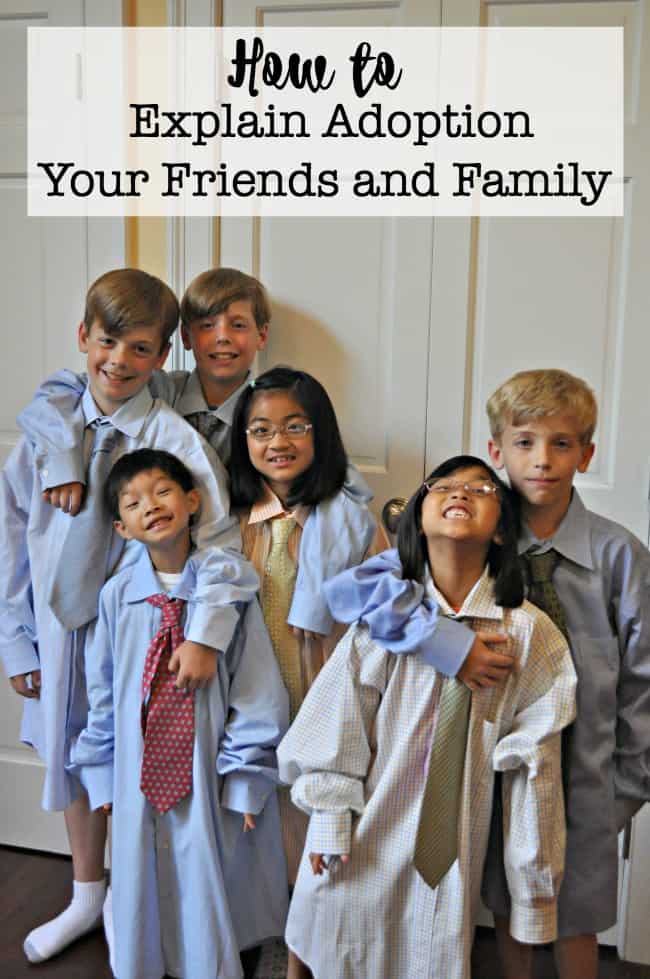
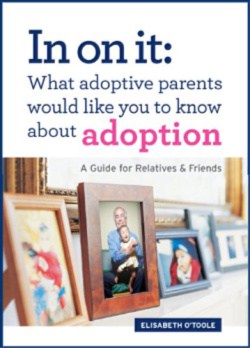
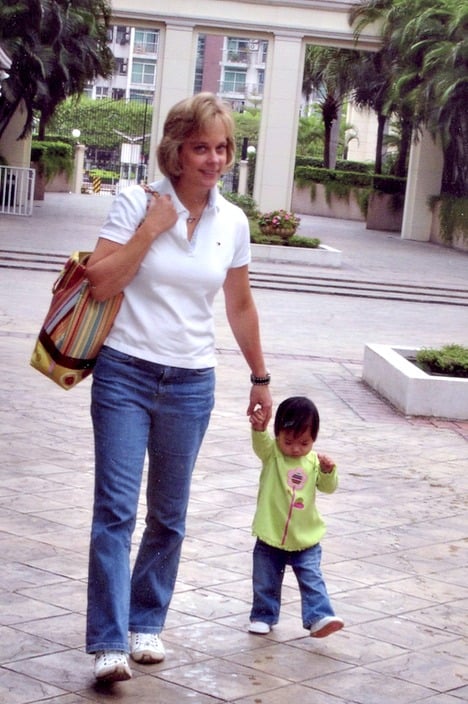
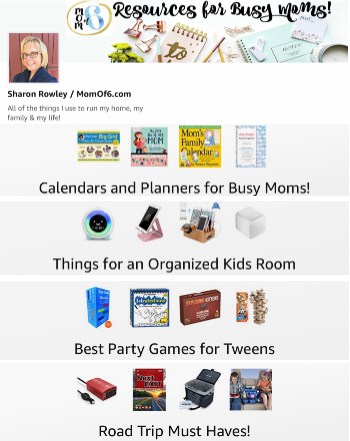
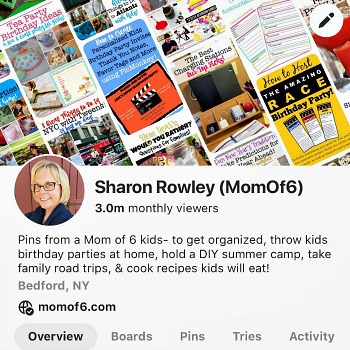
Diane Hall says
Good morning, may I or will you share this wonderful book about explaining adoption on your facebook page?
www.childofourhearts.com
A friend/client and local physician wrote this book.
His name is Dr.Paul Janson
Sharon says
Hi Diane-
The website is www.childinourhearts.com and it appears to be a lovely book that parents can use to explain adoption to their children. I have not read the book- so I cannot recommend it to others. But you can feel free to share your own opinion about it here in the comments.
Kris C. says
As an adoptive parent x2, I’m definately going to check out this book. Trouble is, I can never remember all the great wording when I’m caught off guard. Think I need to rehearse, rehearse, rehearse! 🙂 As for adoption vs age or stage, ‘Adopted-the Comic’ has a great comic on this (and others) that I always think about when my kids start acting out. http://www.adoptedthecomic.com/comic/parental-worries/